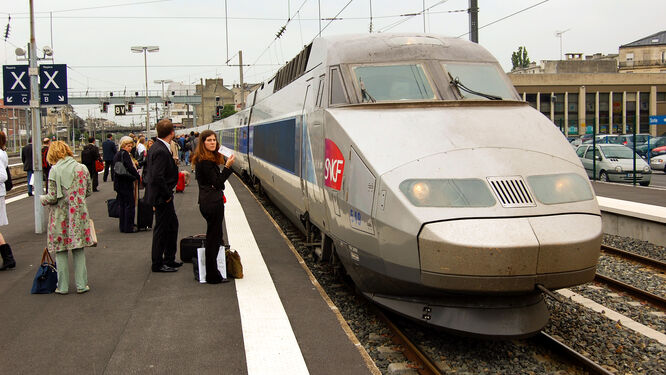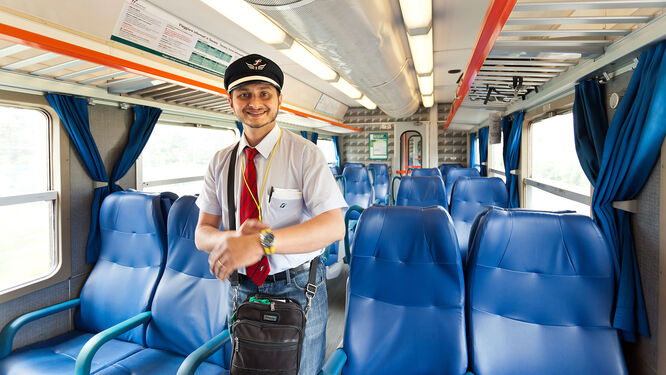Do I Need Seat Reservations?

By Rick Steves
Whether you're traveling with a rail pass or not, it's worth taking the time to figure out whether you need seat reservations on European trains — depending on the route and type of train, reservations can be critical…or a pointless hassle and expense.
To Reserve or Not to Reserve?
Some kinds of trains require all passengers to have reservations (which guarantee you a specific seat), and sometimes it's smart to reserve even when it's not compulsory. But most trains don't require reservations, and the vast majority of trains usually have more than enough seating — so don't make the mistake of over-reserving. Many American travelers waste money and surrender their flexibility after being swayed by US-based agents who profit from exaggerating the need for reservations.
Compulsory Reservations
Your best resource for identifying trains that truly require a reservation is the Deutsche Bahn's online schedule — it's objective, complete, and easy to use.
Though relatively few train types require reservations, those that do are among the most popular. They include a few privately run international trains, such as the Eurostar (which connects London, Paris, Brussels, Amsterdam, and Cologne/Dortmund), and a handful of special just-for-tourists trains (such as the Norway in a Nutshell route, and several of Switzerland's specially designated scenic trains).
Aside from these one-offs, many countries have at least one category of high-speed train that always requires reservations — most notably France, Italy, Spain, and Sweden. Some countries have a few long-distance — though not necessarily high-speed — must-reserve routes, such as Finland, Norway, and Poland. And you'll need to book ahead (or at least pay a little extra) for a spot on nearly all overnight trains in Europe.
In many cases, these required reservations aren't so much a matter of space constrictions, but a surcharge for the privilege of riding the fastest (or fanciest) train. But on certain routes where all passengers must have an assigned seat, spots can sell out quickly (see "How Far Ahead?" below).
Optional Reservations
Reservations can still be a good idea on trains that don't require them. For example, it's wise to reserve at least several days ahead if you're traveling during a peak time (summer, weekends, holidays), on a route with infrequent service, if you need several seats together (a family with children), or for a train you simply cannot afford to miss.
Otherwise, I wouldn't recommend reserving a seat if you don't have to; most slower regional trains don't even give you the option. Most of the time, trains have plenty of seating for everyone, and even if you wind up on a crowded train, the worst-case scenario is that you'll stand a while before a seat frees up.
How to Make Seat Reservations
If you're using a rail pass to cover your train travel, seat reservations cost extra: typically ranging between $5 and $35 (except in Britain, where they're free — for example on the long-distance LNER line), with a few more-expensive exceptions.
With point-to-point tickets, however, the ticket price includes the cost of any mandatory reservations (dates, times, and seat assignments are built in, just like with an airline ticket). If you opt to reserve a seat on a train that doesn't require reservations, you'll need to pay a small extra fee.

For trains that don't need to be booked very far in advance, it's best to simply make all your reservations at one time at any staffed station in Europe.
If you need to lock in your reservations well in advance of your train trip, book them ahead of time from home. For many trains you can get them through ricksteves.com (after all, you're already here!). Passholder reservations are availble through us for two types of international trains — Eurostar (described above) and Lyria (between France and Switzerland) — and for some trains within France, Italy, and Spain. (Since single-country Eurail passes don't appear on the dropdown for passholder reservations, chose "Eurail Global Pass" even if you just have a single-country pass; this help page has more tips.) All US-based websites and travel agents sell European train reservations for the exact same prices you'll find here (though some may charge more).
If yours is a Eurail-brand pass, you can also start reserving seats with Eurail's Rail Planner app (where your digital pass is stored), or through Eurail's site. Since reservations aren't currently synced to the app, you'll save them on your phone as separate tickets. A few rail operators also sell passholder reservations for trains in their system, including Switzerland's Glacier Express, the Deutsche Bahn (though seat reservations are optional on German trains), Nightjet (Austria-based night trains), and Caledonian Sleepers (Scotland–London night trains).
See Eurail's complete, country-by-country list of options for booking seat reservations.
For more information on passholder reservation fees for popular trains, check this site's country-specific rail pages (see sidebar) for any countries you're planning to visit.
How Far Ahead?
Whether you're traveling with a rail pass or just buying tickets as you go, you can purchase seat (or overnight berth) reservations anywhere from an hour to several months in advance.
How far in advance to reserve any given train also depends on the rigidity of your schedule (do you have hotel reservations or a flight to catch?), how many departures in a day could get you there on time (2 or 20?), and the likelihood of seats (or at least reservations) selling out — consider public holidays and events likely to draw a crowd.
Be aware that trains with compulsory reservations may have a limited number of seats available to passholders (most notoriously France's fastest international services). Along some of the most popular routes, such as between Paris and Italy, direct trains run only a few times per day; these can sell out weeks ahead.
No matter when you're going, I'd recommend booking as far ahead as possible for the following trains:

